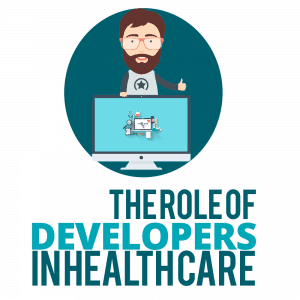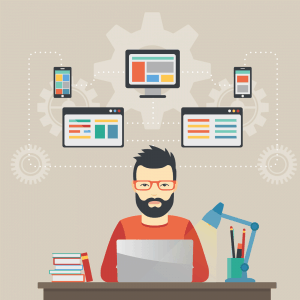 As the health care industry continues to modernize systems and processes, there is an ever-growing need for software engineers, information technology (IT) professionals, and general developers. Data scientists and IT technicians are in high demand to assist with the organization, processing, and handling of various health and patient data streams.
As the health care industry continues to modernize systems and processes, there is an ever-growing need for software engineers, information technology (IT) professionals, and general developers. Data scientists and IT technicians are in high demand to assist with the organization, processing, and handling of various health and patient data streams.
Furthermore, cybersecurity and proper systems protection are crucial to securing the resulting portals and data, since we all know personal health information and medical history is incredibly sensitive.
What this ultimately means is that developers will have considerable opportunities in the world of health care, with plenty of rewarding career options and pathways as a result.
Responsibilities and Roles
Some more common responsibilities and roles include:
- Health care information systems developer and technician
- Medical software engineer
- Data and systems analyst
- Health care application and portal developer
- IT and cybersecurity specialist
- Network developer
- Internet of things (IoT), wearable and equipment sensors technician
- Artificial intelligence (AI) and automation application developer
Many careers and opportunities within health care overlap with other industries. IT and cybersecurity, or AI and automation developers, for instance, have a place in just about every industry from retail and marketing to hospitality. What makes health care particularly enticing—more so in some cases—is that it’s a relatively young field, technologically speaking, so actors would have a strong influence on the direction and future of the market.
Instrumental Tasks
While there are many opportunities, some core responsibilities and roles will prove instrumental to the future of health care and modern medical technologies.
Whenever a new technology or form of device crops up, developers and software engineers must then craft the digital experiences and platforms we use to interface with said devices. Smart home technology, for example, requires a series of mobile apps and web apps that consumers use to control the technology. In the medical and health care fields, many of the systems and applications that will be necessary to interface with industry devices have not yet been created. Those that do exist will most certainly need improvements or modifications to meet modern requirements.
As the world we live in becomes more digital by the day, user experience has become a huge topic within the medical field in regard to software and technological devices. Patients now have more knowledge than ever at the tips of their fingers, so developers have to shift to a patient-centric mindset. Not only must developers think about the patient first, they also have to find a way to make their products cost-effective and scalable to extend the product’s reach.
Specific to the health care field, developers and programmers will need to make sure their product is compliance-aware and speaks the health care vocabulary. The Health Insurance Portability and Accountability Act (HIPAA) is a serious factor that developers cannot overlook, and it’s best they make themselves aware of what HIPAA compliance means so they can ensure their product meets security and availability standards. On top of that, if you’re making programs for the health care field, you must make sure you at least somewhat understand the language being used and that your product stores the information correctly.
Creating New Platforms
Therein lies the core goal of the average developer working in the health care and medical industry. Until such technologies and systems are more commonplace and standardized, developers will need to craft the necessary platforms and applications that doctors, nurses, and health care practitioners use on a daily basis.
It stands to reason that a secure distribution system for issuing restrictive medications only to authorized parties must first get developed before it can be deployed. IoT sensors and wearable monitors must first engage and report back to a primary monitoring application before the medical data can get processed and harvested. It is these general experiences and platforms that developers will create.
How Developers Fit
Of course, once the platform/software is established and rolled out at a mainstream level, it will then become important to maintain, improve, and protect the resulting systems and networks. And in a world where cybersecurity is a monumental concern, there are endless possibilities as to what and how a developer might fit into the equation.
You must also consider the fact that many companies and professionals involved in the medical field have little to no experience with software and application development. Not only will they look for experienced professionals to help create the platforms, but they will also need guidance and advice for achieving maximum quality, security, and efficiency.
How Can Developers Prepare?

According to the Bureau of Labor Statistics, the median annual pay for software developers is $107,600. While coding education is a lot of work and certainly takes a considerable amount of training, that salary alone is well worth the investment. It’s also safe to assume that in the medical industry—where developers are in high demand—pay will be reasonably higher.
So, how would one prepare to enter the medical and health care industry? What kind of training is required, and what languages should help secure a position?
Desirable skills and experience are no different than in any other industry. They depend heavily on what you will do and what responsibilities you’re expected to satisfy. If you’re working in mobile app development, for example, it’s crucial to know Java for Android development and Swift or C# for iOS and Apple platforms.
If you’re working with relational databases or data science applications, it would instead be necessary to know and understand SQL and basic C. If you’re developing web applications or portals, you’ll need to know HTML, PHP, ASP.net, and any number of mobile and web-based languages. In fact, many of these languages are considered the top or most popular skills for modern health care and IT developers, in general.
Time to Decide
Step one is to decide when and where you will fit in. What role or career will you pursue and how will that affect your overall résumé? If there are skills and training that you don’t already have, then you’ll need to acquire them before submitting an application or pursuing an opportunity.
The good news is that you have plenty of time because the health care and medical industry will continue to need developers and software engineers for the foreseeable future. It’s not a stretch to say that from this point on, they will always need developers in some capacity. Digital and modern technologies are taking hold, and they’re here to stay.
Start Looking Today
If you absolutely don’t know where to start, just take a look at some of the more popular job boards and recruitment platforms. You will find a variety of openings and opportunities where medical companies are looking for experienced developers. At the least, this will give you some idea of what you may—or may not—be interested in pursuing.
